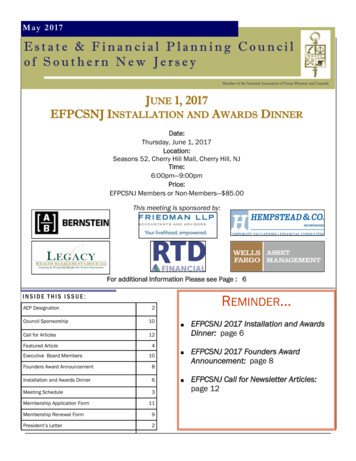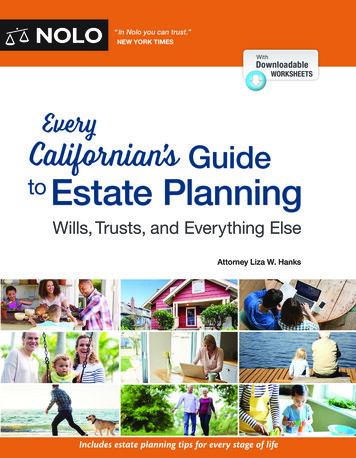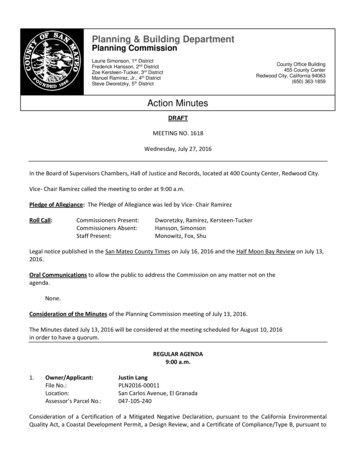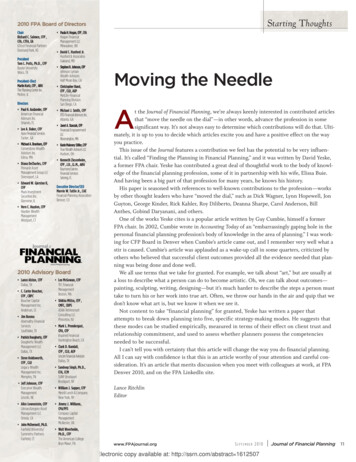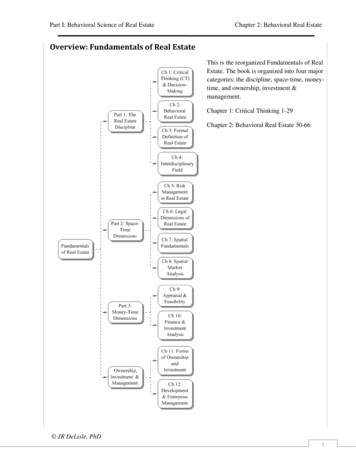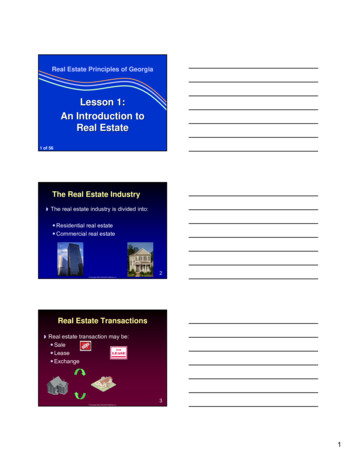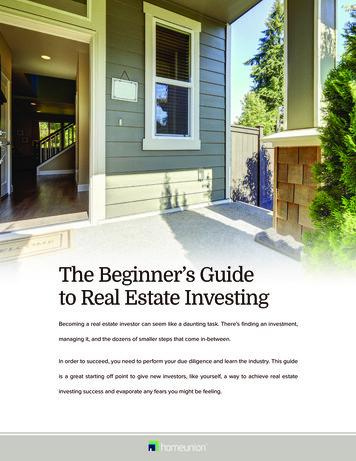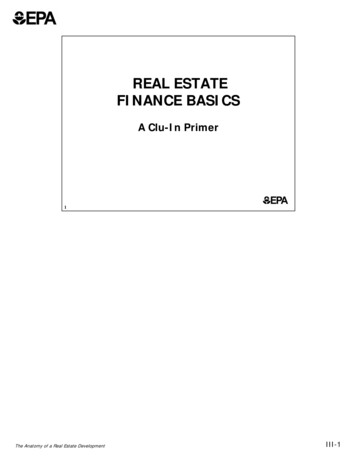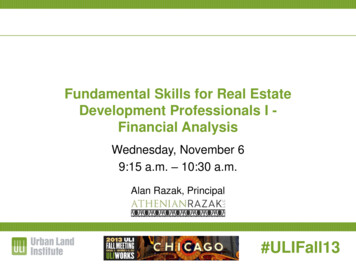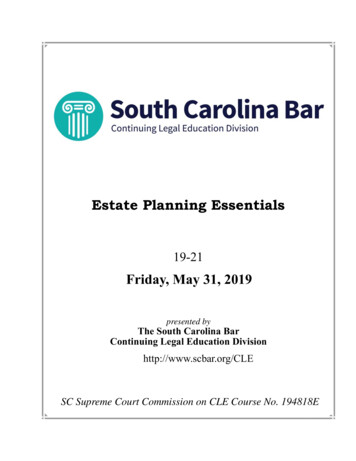
Transcription
Estate Planning Essentials19-21Friday, May 31, 2019presented byThe South Carolina BarContinuing Legal Education Divisionhttp://www.scbar.org/CLESC Supreme Court Commission on CLE Course No. 194818E
Table of ContentsSubstantive Law of South Carolina . 7Melody BreedenInitial Estate Planning Interview.29Scott W. HuttoDrafting Wills– Scenario 1 .59Scott W. HuttoNon-Probate Transfers .70Catherine H. KennedyDrafting Wills-Scenario 2 .105Matthew MyersDrafting Financial Powers of Attorney, Health Care Powers of Attorney and Living Wills .118Matthew MyersDrafting Revocable Trusts-Scenario 3 .145Patricia ScarboroughDrafting Revocable Trusts- Scenario 4 .188Catherine H. KennedyEthical Pitfalls in Estate Planning .235Patricia ScarboroughSC Bar-CLE publications and oral programs are intended to provide current and accurate informationabout the subject matter covered and are designed to help attorneys maintain their professionalcompetence. Publications are distributed and oral programs presented with the understanding that the SCBar-CLE does not render any legal, accounting or other professional service. Attorneys using SC Bar-CLEpublications or orally conveyed information in dealing with a specific client's or their own legal mattersshould also research original sources of authority. 2019 by the South Carolina Bar-Continuing Legal Education Division. All Rights ReservedTHIS MATERIAL MAY NOT BE REPRODUCED IN WHOLE OR IN PART WITHOUT THEEXPRESS WRITTEN PERMISSION OF THE CLE DIVISION OF THE SC BAR.TAPING, RECORDING, OR PHOTOGRAPHING OF SC BAR-CLE SEMINARS OR OTHER LIVE,BROADCAST, OR PRE-RECORDED PRESENTATIONS IS PROHIBITED WITHOUT THE EXPRESSWRITTEN PERMISSION OF THE SC BAR - CLE DIVISION.
Estate Planning EssentialsFriday, May 31, 2019This program qualifies for 6.75 MCLE; 0.75 LEPRSC Supreme Commission on CLE Course #: 194818E8:30 a.m.Registration8:55 a.m.Welcome and Opening Remarks9:00 a.m.Substantive Law of South CarolinaMelody BreedenTurner Padget Graham & Laney, PA9:45 a.m.Initial Estate Planning InterviewScott W. HuttoHutto Law Firm, PA10:15 a.m.Break10:30 a.m.Drafting Wills- Scenario 1Scott W. Hutto11:15 a.m.Non-Probate TransfersCatherine H. KennedyTurner Padget Graham & Laney, PA12:00 p.m.Lunch12:30 p.m.Drafting Wills-Scenario 2Matthew MyersSweeney, Wingate & Barrow, PA1:15 p.m.Drafting Financial Powers of Attorney, Health Care Powers of Attorney and LivingWillsMatthew Myers2:15 p.m.Break2:30 p.m.Drafting Revocable Trusts-Scenario 3Patricia ScarboroughEvans Carter Kunes & Bennett, PA3:00 p.m.Drafting Revocable Trusts-Scenario 4Catherine H. Kennedy3:30 p.m.Panel Discussion and Planning Scenarios Wrap-up4:00 p.m.Ethical Pitfalls in Estate PlanningPatricia Scarborough4:45 p.m.Adjourn
Estate Planning EssentialsSPEAKER BIOGRAPHIES(by order of presentation)Scott W. HuttoHutto Law Firm(course planner)Scott W. Hutto is the sole shareholder of Hutto Law Firm, P.A., located in Georgetown, SouthCarolina. Scott practices in the areas of estate planning, probate administration, probate litigationand corporate planning. Scott received his B.A. degree, cum laude, from Wofford College in 1991and his J.D. degree from the University of South Carolina in 1998. He is a member of the AmericanBar Association, the South Carolina Bar and the Georgetown County Bar. In 2005, Scott wasinitially certified as a Specialist in Estate Planning and Probate Law by the South Carolina SupremeCourt and was re-certified in 2015. Scott is also a Fellow of the American College of Trust andEstate Counsel (ACTEC). He has served two terms as a member of the Estate Planning and ProbateLaw Specialization Advisory Board, and he is a frequent speaker on the topics of estate planningand probate administration. Scott is active in his community and is Co-chair of Georgetown Bridgeto Bridge ½ Marathon Committee and a board member of the Tidelands Community HospiceFoundation. Scott is a past board member of the following organizations: Probate, EstatePlanning and Trust Section of the South Carolina Bar, Georgetown County Board of Education,Waccamaw Community Foundation, Friendship Place, Freedom for Kids Playground, Arial, AMinistry of Proclamation and All Saints Church, Pawleys Vestry. He is a member of Prince George,Winyah Church. Before attending law school, Scott served four years as an Air Defense Officer inthe United States Army. Scott has been married to his wife, Laura, for Twenty-seven years, andthey have two children.Catherine H. KennedyTurner Padget Graham & Laney, PA(course planner)Catherine Hood Kennedy is a certified specialist in Estate Planning and Probate Law, practicingwith the firm of Turner Padget Graham & Laney, PA., in its Columbia office. Ms. Kennedy receivedher J.D. degree, cum laude, from the University of South Carolina School of Law. She is a past-chairof the Probate and Estate Planning Section of the Bar, is a fellow of the American College of Trustand Estate Counsel, is listed in Best Lawyers in America--Trust and Estates and Litigation-Trustsand Estates and has been named a South Carolina Super Lawyer in Estate and Trust Litigation.From 1987 to 1999, she served as the Richland County Probate Judge.Ms. Kennedy frequently testifies before legislative committees on changes in South Carolina
probate and trust law and serves as an expert witness in probate matters. She served on thecommittee studying the Uniform Trust Code, which resulted in the enactment of the SouthCarolina Trust Code in 2005 and chaired the Bench/Bar committee that recommended thechanges to the South Carolina Probate Code, which become effective in 2014 and 2016. She is theauthor of the chapter on estate planning in A Practical Guide to Elder and Special Needs Law inSouth Carolina.Since 2000, Ms. Kennedy has been a South Carolina certified mediator and arbitrator. She wasinvolved in drafting S. C. Probate Court Rule 5, which provides for mediation in the probate courts.Ms. Kennedy has served in the South Carolina Bar’s House of Delegates since 2002 and is currentlya member of the Board of Governors of the Bar.Melody BreedenTurner Padget Graham & Laney, PAMelody Breeden is a Shareholder at Turner Padget Graham & Laney, PA. She has been practicingestate planning and probate law primarily in the Myrtle Beach area since 2002. Melody is licensedin both North and South Carolina. Melody is certified as a Specialist in Estate Planning andProbate Law by the South Carolina Supreme Court. Melody is a fellow of the American College ofTrust and Estate Counsel. Melody is also certified by the South Carolina Board of Arbitrator andMediator Certification as a Civil Court Mediator. Melody is the 2018/2019 Chair of the Probate,Estate Planning and Trust Council of the South Carolina Bar. She serves on the South CarolinaEstate Planning and Specialization Advisory Board.Melody is a member of the following Bar Associations: the American Bar Association, the HorryCounty Bar Association, the North Carolina State Bar, the North Carolina Bar Association, and theSouth Carolina Bar. She is a Member of the SC Bar House of Delegate.Melody is also a member of the following organizations: Elder Law Committee of the SouthCarolina Bar; Grand Strand Area Estate Planning Council; Horry County Probate Court AdvisoryCouncil; Chair of the Coastal Planned Giving Advisory Council of Coastal Carolina University; andNational Association of Elder Law Attorneys (NAELA).Melody is a Practical Law Contributor for Thomas Reuters on the topics of Health Care Powers ofAttorney, Ancillary Probate, Signature Pages for Wills & Self Proving Affidavits, Wills, Probate,Revocable Trusts, and Powers of Attorney for South Carolina.Matthew MyersSweeney, Wingate & Barrow, PAMatt focuses his practice in the general areas of trusts, estates, probate, taxation, business entities,and nonprofits, including planning, administration, litigation, and transactions in each of theseareas. He is a certified specialist in Estate Planning and Probate Law, a member of the ColumbiaEstate Planning Counsel and the Columbia Tax Study Group, and the author of "The South CarolinaPersonal Representative Handbook,” as published by the South Carolina Bar Association.In law school, Matt served as an editor for the Real Property Probate and Trust Journal, beforegoing on to obtain an advanced degree in taxation from the University of Florida. Prior to law
school, Matt studied economics at the University of South Carolina Honors College andsubsequently worked in the banking industry for several years as a commercial loan officer andcredit analyst.Matt is a native of Darlington, South Carolina, and is married to the former Sarah Grove ofWhiteville, North Carolina. They have two children and are members of Shandon UnitedMethodist Church.Patricia ScarboroughEvans Carter Kunes & Bennett, PAF. Patricia Scarborough is a shareholder with the law firm of Evans, Carter, Kunes & Bennett, P.A.in Charleston, South Carolina. Patty focuses her practice in the areas of estate planning, probateadministration, tax planning, business planning and charitable organizations.Patty received her J.D. from the University of South Carolina School of Law in 2005 and her LL.M.in Taxation from the University of Florida School of Law in 2006. She is a member and pastChairman of the Tax Law Section of the South Carolina Bar, and has been certified by the SouthCarolina Supreme Court as a Specialist in both Taxation Law and Estate Planning and Probate Law.
Estate Planning EssentialsFriday, May 31, 2019Substantive Law of South CarolinaMelody Breeden
Substantive Law of South CarolinaMelody J. E. BreedenTurner Padget Graham & Laney, PAPost Office Box 2116Myrtle Beach, SC 29578(843) 213-5530MBreeden@Turnerpadget.com
I.The South Carolina Probate Code governs wills in South Carolina (S.C. CodeAnn. §§ 62-1-101 to 62-8-403).II.Definitions.A.It is important to familiarize yourself with some of the basic definitions inthe Probate Code before you begin drafting estate planning documents. Afew of the important definitions in the Probate Code include:1.Child.a.2.Issue.a.3.The definition of parent includes any person entitled to takeunder this code but excludes stepparent, foster parent, orgrandparent. S.C. Code Ann. § 62-2-201(31).Personal Representative.a.III.The definition of issue includes natural or legally adopteddescendants. S.C. Code Ann. § 62-1-201(24).Parent.a.4.The definition of child excludes stepchildren, foster children,and grandchildren. S.C. Code Ann. § 62-1-201(3). Child isfurther defined in S.C. Code Ann. § 62-2-109 to speciallyinclude adopted children.The definition includes executor, administrator, specialadministrator and related terms. S.C. Code Ann. § 62-2201(33).Capacity to Make a Will.A.Before you can even begin drafting any estate planning documents, youmust first asses the individual’s capacity.B.Any individual who is of sound mind and who is not a minor may make awill. S.C. Code Ann. § 62-2-501.C.A minor cannot create a will. In South Carolina, a person is not a minor ifthe person is either:1.18 years of age or older.2.Emancipated by court order.3.Legally married.1
(S.C. Code §§ 62-1-201(27) and 62-2-501).D.For the testator to have the mental capacity sufficient to make a will, thetestator must understand:1.The nature and extent of the testator's assets.2.The object of the testator's bounty.3.How the testator wants assets to pass at death.(In re Washington's Estate, 46 S.E. 2d 287, 289 (S.C. 1948)).IV.Execution Requirements of a Will.A.The will must be signed by at least two individuals that witnessed eitherthe signing of the will or the testator's acknowledgment of the signature ofthe will (S.C. Code Ann. § 62-2-502(3)). It is preferred that all witnessesand the testator are in the same room at the same time while the will isbeing executed.B.A will must be signed by the testator or signed in the testator's name bysome other person in the testator's presence and by the testator'sdirection (S.C. Code Ann. § 62-2-502(2)).C.A subscribing witness receiving a gift under the will (or the spouse or issueof which receives a gift under the will) can attest or prove a will. However,unless there are two additional disinterested witnesses, the interestedwitness or the interested witness's spouse or issue generally cannot takeunder the will anything more than that to which the person is entitled inintestacy (S.C. Code Ann. § 62-2-504). Therefore, it is a better practice touse two disinterested witnesses to any interested witness or that witness'sspouse or issue losing a benefit under the will.A notary is not required for a will to be valid, but is required to make thewill self-proving (S.C. Code Ann. § 62-2-503). It is advisable to make a willself-proving at the time of execution.D.E.A valid will does not require a self-proving affidavit. However, with a fewexceptions, a will that includes this affidavit may be admitted to probatewithout having to submit additional proof that the will was properlyexecuted. (S.C. Code Ann. § 62-2-503.) It is advisable to include a selfproving affidavit with every South Carolina will. A will without theattestation and self-proving affidavit may require an additional swornstatement or affidavit from a person with knowledge of the circumstancesof the will's execution to probate the will (S.C. Code Ann. § 62-3-303(c)).F.A subscribing witness receiving a gift under the will (or the spouse or issueof which receives a gift under the will) can attest or prove a will. However,unless there are two additional disinterested witnesses, the interestedwitness or the interested witness's spouse or issue generally cannot takeunder the will anything more than that to which the person is entitled inintestacy (S.C. Code Ann. § 62-2-504). Therefore, it is a better practice to2
use two disinterested witnesses to any interested witness or that witness'sspouse or issue losing a benefit under the will.G.The attestation clause states that the will was signed or acknowledged bythe testator in the presence of the witnesses and that the testator declaredto each of the witnesses that the document is the testator's will (S.C. CodeAnn. § 62-2-503). It is common practice in South Carolina to include thefollowing attestation, along with a self-proving clause, as provided bystatute:I, [TESTATOR NAME], the testator, sign my name to thisinstrument this [DAY] day of [MONTH], [YEAR], and beingfirst duly sworn, do hereby declare to the undersignedauthority that I sign and execute this instrument as my lastwill and that I sign it willingly (or willingly direct another tosign for me), that I execute it as my free and voluntary act forthe purposes therein expressed, and that I am eighteenyears of age or older (or if under the age of eighteen, ammarried or emancipated as decreed by a family court), ofsound mind, and under no constraint or undue influence.We, [FIRST WITNESS NAME] and [SECOND WITNESSNAME], the witnesses, sign our names to this instrument,and at least one of us, being first duly sworn, does herebydeclare, generally and to the undersigned authority, that thetestator signs and executes this instrument as the testator'slast will and that the testator signs it willingly (or willinglydirects another to sign for the testator), and that each of us,in the presence and hearing of the testator, hereby signs thiswill as witness to the testator's signing, and that to the bestof our knowledge the testator is eighteen years of age orolder (or if under the age of eighteen, was married oremancipated as decreed by a family court), of sound mind,and under no constraint or undue influence.H.South Carolina permits holographic or handwritten wills. However, to bevalid, holographic wills must meet the statutory requirements for a will(S.C. Code Ann. §§ 62-2-502 and 62-2-505). For more information on theexecution requirements for a will, see Will Execution Requirements.I.South Carolina does not recognize oral wills. All wills must be in writing.(S.C. Code Ann. § 62-2-502).J.A contract to make, revoke, or to not revoke a will, if the will is executedafter January 1, 2014, can only be established by either:1.A provision of the will stating the material provisions in the contract.3
2.An express reference in the will to a contract and extrinsic evidenceproving the terms of the contract.3.A writing signed by the decedent showing the contract and extrinsicevidence proving the terms of the contract.(S.C. Code Ann. § 62-2-701).4.V.The execution of joint and mutual wills does not create apresumption of a contract to not revoke the will or wills (S.C. CodeAnn. § 62-2-701).Contracts to make, revoke, or to not revoke willsare rarely used in South Carolina.Rights of Individuals to Inherit.A.Surviving Spouse.1.A testator cannot disinherit a surviving spouse without a validwaiver of spousal rights in a prenuptial agreement, postnuptialagreement, or waiver, signed by the waiving spouse (S.C. CodeAnn. § 62-2-204).2.Without a valid waiver, the surviving spouse has an elective shareright to claim against the probate estate of the decedent (S.C. CodeAnn. § 62-2-201). The surviving spouse of a decedent that was aSouth Carolina resident can claim one-third of the decedent'sprobate estate as the surviving spouse's elective share (S.C. CodeAnn. §§ 62-2-201 to 62-2-207).3.A revocable trust is illusory for purposes of calculating a survivingspouse's elective share and the assets in the trust is included todetermine the spouse's elective share (S.C. Code Ann. §§ 62-2202(b) and 62-7-401(c)). However, the spouse is charged for giftsreceived because of the decedent's death (including those from thedecedent's revocable trust in calculating the elective share) (S.C.Code Ann. § 62-2-207).4.If the decedent was not a South Carolina resident, the survivingspouse's elective share for South Carolina property is governed bythe law of the decedent's domicile (S.C. Code Ann. § 62-2-201(b)).5.In certain cases, a spouse married to the testator may have certainrights to claim an intestate share of the decedent's estate.6.The drafting attorney should ensure that the testator is aware of thesurviving spouse's rights, if applicable, and draft accordingly.4
B.C.Effect of Divorce.1.On divorce or annulment, the former spouse is not considered asurviving spouse (unless the spouses remarry and are married atthe decedent's death). On divorce or annulment, provisions in atestator's will that affect the testator's former spouse also are void.The former spouse is treated as if the spouse predeceased thetestator. (S.C. Code Ann. §§ 62-2-507 and 62-2-802).2.However, many attorneys recommend that the testator execute anew will after a divorce is final or in anticipation of a pendingdivorce.Effect of Marriage After Execution of Will.1.If a testator fails to provide by will for the testator's surviving spousethat married the testator after the execution of the will, the omittedspouse can claim the omitted spouse's elective share of theprobate estate, unless either of the following apply:a.It appears from the will that the omission was intentional.b.The testator provided for the surviving spouse by transferoutside the
Sweeney, Wingate & Barrow, PA 1:15 p.m. Drafting Financial Powers of Attorney, Health Care Powers of Attorney and Living Wills Matthew Myers 2:15 p.m. Break 2:30 p.m. Drafting Revocable Trusts-Scenario 3 Patricia Scarborough Evans Carter Kunes & Bennett, PA 3:00 p.m.
